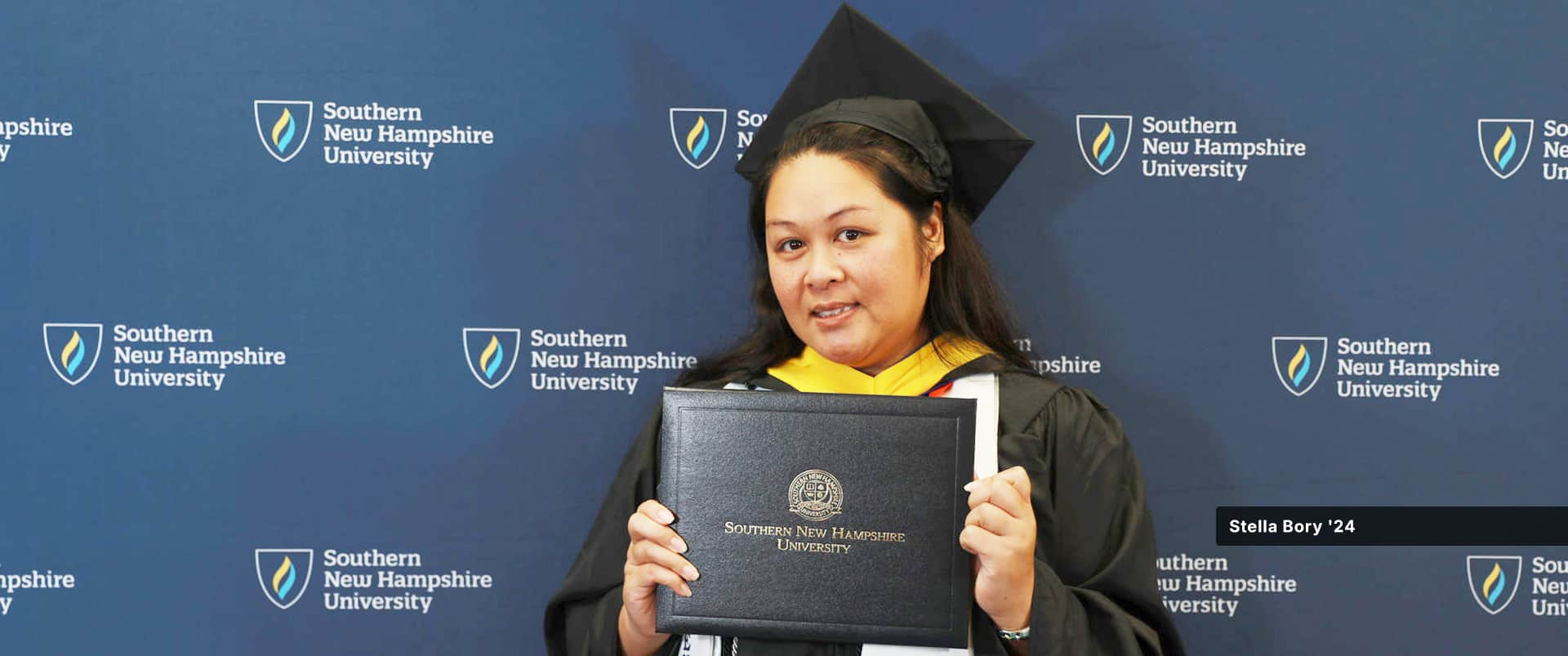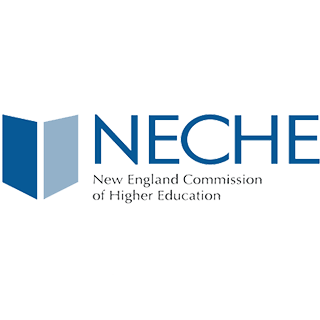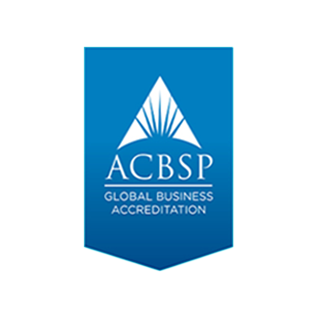How Military Veteran Angel Delatorre Found Psychology
Social Sciences | 3min Read

Undergrad Cost per Credit $342
Grad Cost per Credit $659
Total Credits 12
In today’s fluid workforce environment, HR professionals are focused on strategic partnership. Whatever the trends – automation, artificial intelligence, financial literacy, remote work – HR manages the workforce needs of organizations in nearly every job sector, and their role in an organization's success only grows.
If you're looking to take your first step toward learning new skills in the HR industry, Southern New Hampshire University's Undergraduate Human Resource Management Certificate can provide you with a solid foundation.
However, if you already have a bachelor's degree in another field or earned a related degree and want an advanced credential, the Graduate Human Resource Management Certificate may be a good fit for you.

For those looking to join the human resources field, the undergraduate HR certificate offers the quick, hyper-focused point of entry you’re looking for with courses covering topics such as HR functions, employee experience and labor relations. You can also apply the credits from this certificate to SNHU's Bachelor of Science in Human Resource Management. If you're just getting started, no problem – there's no prior college degree required for admission to the undergraduate HR certificate program.
From compensation and benefits to long-term strategic planning, the graduate HR certificate covers many interesting facets of the field. If you think you'll want to continue your education in the future, the credits earned in this certificate can apply to SNHU's Master of Science in Human Resource Management. Applicants must have a completed bachelor's degree, whether in a related field or otherwise, for admission to the graduate HR certificate program.
The 12-credit undergraduate certificate is right for you if:
The 12-credit graduate certificate is right for you if:
Don't have a bachelor's in business? You may be required to take a foundation course, Human Behavior in Organizations, before beginning the program. Your admission counselor can help determine if this class will be necessary for you.
Visit the course catalog to view the full Graduate Human Resources Management Certificate curriculum.
Our graduates can be assured that the HR skills they're learning are the most relevant to the field today. Whether you choose the undergraduate or graduate HR certificate, our programs are informed by the Society for Human Resource Management's Body of Applied Skills & Knowledge™ (SHRM BASK™). Developed through a series of large-scale research studies, the SHRM BASK incorporates global HR viewpoints to collectively establish a grouping of critical HR competencies and content areas.
The SHRM BASK is also used to define the content areas for SHRM's two main certification exams, the SHRM Certified Professional (SHRM-CP®) and the SHRM Senior Certified Professional (SHRM-SCP®). Shaped by SHRM BASK, SNHU's program supports content preparedness for eligible individuals who may choose to pursue SHRM’s optional credentials.
For the undergraduate certificate, embedded HRCI certificates in the courses will help promote your specialized skills to potential employers.
Minimum Specifications:
Additional Information:
Our no-commitment application can help you decide if SNHU is the right college for you and your career goals. Apply up until 2 days before the term starts!
Upcoming undergraduate term starts: May 4, 2026 | June 29, 2026
Upcoming graduate term starts: July 6, 2026 | September 21, 2026
Attending college online at SNHU can be a life-changing experience. In fact, 93.4% of online students would recommend SNHU according to a 2025 survey with 8,718 respondents.
Our instructors are dedicated to your success, helping to provide you with the knowledge and skill set employers seek. And with real-world experience in human resources management, they bridge theory to practice so you can see how scenarios unfold for actual organizations.

With over two decades of teaching experience in higher education and 25 years of leadership in human resources at the C-suite level, Deborah Gogliettino brings a wealth of knowledge to the HR faculty at SNHU. Credentialed in executive coaching, Gogliettino enjoys mentoring emerging leaders. She also holds the designation of Senior Professional in Human Resources® (SPHR) from Human Resource Certification Institute® and has written about the value of continuous learning for the organization.
Position
Associate Dean of Business
Joined SNHU
2015
Education
Read more about Deborah Gogliettino and other online faculty at SNHU.
Hear what some of our SNHU instructors have to say about our online HR certificate programs:
 "SNHU has an amazing sense of community both for students and faculty. Students who desire a degree that will help them attain ready-to-work skills, have the support of distinguished faculty who are leaders in their field, and those who want flexibility in their education, this is an amazing institution that truly can transform lives."
"SNHU has an amazing sense of community both for students and faculty. Students who desire a degree that will help them attain ready-to-work skills, have the support of distinguished faculty who are leaders in their field, and those who want flexibility in their education, this is an amazing institution that truly can transform lives."
Ahmir J. Kenyatta, MHREL, PCI, SHRM-CP, human resources faculty member
You’ll take your courses within SNHU’s Brightspace platform. This is where you’ll find your:

At Southern New Hampshire University, you'll have access to a powerful network of more than 400,000 students, alumni and staff that can help support you long after graduation. Our instructors offer relevant, real-world expertise to help you understand and navigate the field. Plus, with our growing, nationwide alumni network, you'll have the potential to tap into a number of internship and career opportunities.
Recently, SNHU has been nationally recognized for leading the way toward more innovative, affordable and achievable education:
Founded in 1932, Southern New Hampshire University is a private, nonprofit institution with over 250,000 graduates across the country. SNHU is accredited by the regional accreditor New England Commission of Higher Education (NECHE), which advocates for institutional improvement and public assurance of quality.
No application fee. No test scores. And no college essay. Just a simple form with basic information. It’s another way SNHU helps you reach your goals sooner.
It's easy, fast and free.
Whether you're applying for an undergraduate or graduate degree, you’ll fill out a form to verify your previous education experience. As part of our admissions process, we'll help you request transcripts from your previous school(s) to see if you can transfer any credits into your SNHU program! (Also for free!)
After reviewing your official evaluation, you can decide if SNHU is right for you! If you choose to enroll, just pick your start date and get ready for classes to begin.
Talk to an admission counselor: 888.327.SNHU | enroll@snhu.edu
SNHU is accredited by the regional accreditor the New England Commission of Higher Education (NECHE). The university also carries specialized accreditations for some programs.
These certificates are accredited by the Accreditation Council for Business Schools and Programs (ACBSP). Student achievement data can be found on the ACBSP accreditation page.


As a nonprofit university, SNHU offers some of the lowest online tuition rates in the country. And when you work with our Financial Services team, we'll explore ways to help you save even more on your education – and customize a payment plan that works for you.
This certificate is not eligible for federal financial aid. Students seeking alternatives to federal financial aid can explore tuition assistance, grants and scholarships, as well as private loans. To learn more about private loans, visit our Funding Your Education with Student Loans page.
Tuition rates are subject to change and are reviewed annually.
*Note: Students receiving this rate are not eligible for additional discounts.
Additional costs: Course materials vary by course.
Tuition rates are subject to change and are reviewed annually.
*Note: Students receiving this rate are not eligible for additional discounts.
Additional costs: Course materials vary by course.
Transfer credits toward your degree program at SNHU. If you’ve taken one course or many, we’ll evaluate them for you.
Fill out the FAFSA to see if you’re eligible for grants or work-study. (You could also be offered loans, though you’ll have to pay those back later.)
Earn credits in leadership, technology and more – while taking advantage of online undergraduate and graduate tuition discounts for active-duty service members and spouses.
Getting free money for college – from SNHU or an outside organization – could help you save hundreds or even thousands of dollars.
Bring in credits from popular options like CLEP, Sophia Learning, Google and other common credit for prior learning (CPL) experiences.
Learn how you can save money with tuition reimbursement from your employer.
Take advantage of an online tuition discount through your organization’s partnership with SNHU. Check with your employer to see if your organization partners with us and if you’re eligible for additional tuition savings and partner education benefits.
Serving as strategic business partners across all aspects of an organization, today’s HR professionals are more valued than ever.
Since HR is a broad field, it offers ample opportunity to focus your career interests with your HR certificate. You might consider going into recruiting, workforce development training or compensation and benefits. With the graduate certificate, you might leverage your specialized expertise in leadership roles.
Whether you choose the undergraduate or graduate HR certificate, you'll gain a solid grounding in human resource principles and practices.
With the undergraduate certificate, you’ll develop the skills and knowledge relevant to a variety of entry-level positions, including:
Help recruit, screen and interview job candidates. Once a candidate is hired, you may handle employee relations, training and compensation and benefits.
Responsible for maintaining personnel records, you might prepare reports, file employment records or maintain classified employee information.
Help resolve disputes between workers and managers, negotiate collective bargaining agreements and coordinate employee grievance procedures.
Recruit people with the right skill sets for roles at organizations that need specialized talent.
Take care of clients' questions and concerns.
If you choose to pursue the graduate certificate, you'll be prepared to search for more advanced roles such as:
Oversee an organization’s administrative functions, including recruiting, interviewing and hiring of new staff. You'll also work with executives on strategic planning.
Compensation managers oversee an organization’s pay structure. Benefits managers run employee benefits programs. In both roles, you'll work directly with senior staff and financial officers.
Projected increase nationally in human resources specialist positions through 2032, according to the U.S. Bureau of Labor Statistics (BLS).1
Projected increase nationally in human resources manager positions through 2032, according to the BLS.1
Understanding the numbers
When reviewing job growth and salary information, it’s important to remember that actual numbers can vary due to many different factors—like years of experience in the role, industry of employment, geographic location, worker skill and economic conditions. Cited projections are based on Bureau of Labor Statistics data, not on SNHU graduate outcomes, and do not guarantee actual salary or job growth.

The human resources management focus has greatly benefited my role as a leader.
Chase Thomas '21G
An online HR certificate is a great way to get your foot in the door or advance your career in HR.
The best place to start is by finding an HR certificate program that matches your career aspirations. Ask yourself: What do I hope to learn through this program? How does it support my goals? If you plan to earn a bachelor's degree, ask if a certificate would position you to seamlessly transfer credits and continue your education.
SNHU's undergraduate certificate in HR will give you course credits that can easily be applied to a bachelor's in human resources. This means, if you choose to earn an undergraduate degree, you'll save time on the way. And even if you don't, you'll still have a credential that can help you stand out to employers.
Once enrolled in an undergraduate certificate program, you'll progress through a series of online learning modules with faculty support to guide you through projects, papers, discussion boards and more.
An undergraduate certificate in HR from SNHU is just 4 courses. And since being a full-time student here means 2 classes per term, you could finish in just two 8-week terms – about 4 months. Even if you work toward your certificate part time (1 course per term), you could finish it in under a year.
A graduate HR certificate at SNHU is also only 4 courses, which could mean two (full time) or four (part time) 10-week terms. Again, your timeline is completely up to you and the good news is that no matter what pace works best for you, your tuition won't change.
Both levels of the certificate are available online at SNHU asynchronously, so you won’t need to be in front of your computer at a set time. You’ll still participate, only instead of in-person lectures, you’ll attend class through weekly online assignments and discussion boards. You can do your assignments when it works for you, turning them in before specified deadlines throughout the week.
SNHU’s admission process is simple and straightforward – just complete our quick online application to get started. No SAT or GMAT scores required, no application fee and you can apply at any time and get a decision within days. Questions? Your admission counselor will guide you through the entire process.
Certificates in HR differ from degree programs in one basic way: They’re faster and more efficient by design. That way, you can delve into the most relevant topics in the field, acquiring the skills and knowledge you need quickly and affordably.
Succeeding in HR starts with the fundamentals of HR. SNHU’s HR certificates online will help you build that foundation. Your courses will cover everything from staffing and talent development to compensation and benefits, labor relations, organizational behavior, HR strategy and more.
You’ll come away prepared to seek an HR position with fresh skills and knowledge you can apply right away.

“I hope to achieve more cultural unity within organizations by using the skills that I have gained with the certificate,” said Tamara Dancy ’20. “I foresee myself being a visionary for any organization that I partner with and help trailblaze the conversations around diversity and inclusion, while maintaining respect for government regulations and the workers’ and organization’s needs.”
An undergraduate certificate in HR could be right for you if:
A graduate certificate in HR could be right for you if:
If you’re already in the HR field, a human resources certificate can give you the academic credential you may need to advance. You’ll have the opportunity to specialize in areas that can increase your professional standing, such as compensation and benefits, labor relations or compliance.
"As HR has been a field I have worked with closely over my career, working in the field is a goal of mine," said Robert Filipkowski '18, who had previously earned his associate and bachelor's degrees at SNHU. "So having the additional certificate and knowledge I gained for the program is invaluable to my personal and professional pursuits. The SNHU program was the best because of previous experience, affordability, quality and flexibility in the learning experience, and the SNHU name."
Filipkowski hopes to continue his education at SNHU by earning a master's in HR with plans to move into a full-time human resources job.
With greater depth of knowledge and a broader skill set, you’ll make yourself more valuable. You may even find your job options expand to include roles like human resources manager and compensation and benefits manager.
There are a variety of positions available to HR professionals, all with varying levels of compensation.
HR professionals provide a unique value to their organization and can support businesses in many different ways. According to the BLS, some examples of well paying HR positions and their median annual wages as of May 2022 include:
Like all positions, compensation can vary based on location, experience and industry. When looking for well-paying HR positions, it's valuable to pay attention to both the job title and field you'll be working in.
A human resources certificate provides a solid grounding in HR principles and practices.
With an undergraduate certificate in HR – and usually paired with a bachelor's degree – you’ll be prepared for a variety of entry-level positions, including:
With an online HR graduate certificate, you could position yourself for roles like:
There are many benefits to an HR certificate. You can use it to complement your bachelor’s degree or human resources work experience. Or you can take advantage of the immersive training it provides to earn a credential so that you can enter the HR job market more quickly than if you pursued a full degree.

Holly Sagers '21 found value in earning her certificate.
"I would do it again just to gain the knowledge and confidence that this program has given me," she said. "It will challenge you and help you better understand the inner workings of an HR department and how to become part of one."
Maybe you have significant work experience and feel like you can place out of general education and business core courses. In that case, a human resources certificate might be your most efficient option.
Certificates in HR also offer a great way to build on a bachelor’s degree in business, project management or another related field. And should you plan to go for your bachelor’s, master’s or MBA in human resources, this program gets you one step closer.
"I love SNHU so much that I decided to continue on for my associate and bachelor’s degrees," said Sagers, regarding using the credits toward other programs at the university.
1Bureau of Labor Statistics, U.S. Department of Labor, Occupational Outlook Handbook, on the internet, at:
Cited projections may not reflect local and/or short-term economic or job conditions and do not guarantee actual job growth.